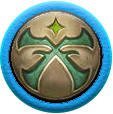
Clockwork MacuahuitlItem 8Legacy Content
Rare Backswing Clockwork Forceful Versatile B Source Grand Bazaar pg. 22Price 550 gp;
Damage 1d10 S;
Bulk 1
Hands 2
Type Melee;
Category Advanced;
Group Club
This finely-made wooden club has a beautiful, lacquered finish that gleams in the sunlight. A heavy ring of gears lined with sharpened pieces of obsidian automatically and constantly spin around the bulk of the wooden club lengthwise. Striking a foe digs the obsidian gears into the enemy's flesh and tears it with its blades. The ever-turning gears also help to dislodge an enemy's defensive position against the weapon.
The clockwork macuahuitl deals 1d10 slashing damage and has the backswing, forceful, and versatile B traits. The clockwork macuahuitl is a two-handed advanced weapon in the club weapon group.
Traits
Backswing: You can use the momentum from a missed attack with this weapon to lead into your next attack. After missing with this weapon on your turn, you gain a +1 circumstance bonus to your next attack with this weapon before the end of your turn.
Clockwork: Clockworks are intricate, complex constructs that can be programmed to perform specific functions. A clockwork creature must be wound regularly to function.
Clockwork items use clockwork to function, though they don’t necessarily require daily winding.
Wind-Up: To remain operational, a clockwork vehicle or creature must be wound with a unique key by a creature. This takes an amount of time listed in the clockwork's wind-up entry, which also lists how long the clockwork remains operational once wound; after this duration, the clockwork becomes inactive and immobile until it's wound again. Some clockworks' abilities require them to spend some of their remaining operational time. They can't spend more than they have and shut down immediately once they have 0 time remaining. If it's unclear when a clockwork was last wound, most are re-wound approximately halfway through their operating time.
A clockwork vehicle can be placed into standby mode by its pilot as a 3-action activity; a clockwork creature must perform this activity itself. A clockwork's operational time doesn't decrease in standby.
A creature can attempt to Disable a Device to wind a clockwork down (with a DC listed in the wind-up entry). For each success, a clockwork vehicle loses 10 minutes of operational time, while a clockwork creature loses 1 hour. This can be done even if the clockwork is in standby mode.
Broken clockwork vehicles have difficulty holding energy. The first time each round that a broken clockwork vehicle moves, it must attempt a DC 5 flat check. On a failure, it loses 10 minutes of operational time.
Forceful: This weapon becomes more dangerous as you build momentum. When you attack with it more than once on your turn, the second attack gains a circumstance bonus to damage equal to the number of weapon damage dice, and each subsequent attack gains a circumstance bonus to damage equal to double the number of weapon damage dice.
Rare: This rarity indicates that a rules element is very difficult to find in the game world. A rare feat, spell, item or the like is available to players only if the GM decides to include it in the game, typically through discovery during play. Creatures with this trait are rare. They typically can't be summoned. The DC of Recall Knowledge checks related to these creatures is increased by 5.
Versatile B: A versatile weapon can be used to deal a different type of damage than that listed in the Damage entry. This trait indicates the alternate damage type. For instance, a piercing weapon that is versatile S can be used to deal piercing or slashing damage. You choose the damage type each time you make an attack.
Critical Specialization Effects
Source Core Rulebook pg. 283 4.0Certain feats, class features, weapon runes, and other effects can grant you additional benefits when you make a Strike with certain weapons and get a critical success. This is called a critical specialization effect. The exact effect depends on which weapon group your weapon belongs to, as listed below. You can always decide not to add the critical specialization effect of your weapon.
Club: You knock the target away from you up to 10 feet (you choose the distance). This is
forced movement.